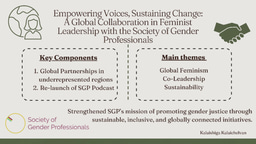LiA Week 2 Log
This week, I was assigned a particularly exciting project: helping to re-launch the SGP podcast. It’s something that the organization had tried before, but like many volunteer-driven efforts, it eventually faded out when key team members moved on. Despite its challenges in the past, the podcast represents a tremendous opportunity to boost SGP’s visibility and reach a wider audience. It’s a chance to make our work and insights more accessible to people around the globe, which feels especially important given the international and inclusive nature of our community.
One of the first tasks I tackled was drafting a script for the podcast’s introduction. We decided that the first series should focus on SGP’s first five years, drawing heavily from the journal article that the SGP founders wrote, titled "Creating a Global Feminist Organization: Applying Theory to Practice." This article is a rich resource, documenting not just the successes of SGP’s early days but also the challenges and lessons learned in trying to put feminist organizational theory into practice. It felt like the perfect foundation for our podcast’s first series because it encapsulates what SGP is all about—how we strive to deconstruct power hierarchies, promote inclusivity, and create a space for gender experts and advocates to come together from around the world.
As I worked on the script, I couldn’t help but think about how important it is to tell this story. The first five years of SGP are a testament to what can be achieved when a group of committed individuals comes together with a shared vision. But they also highlight the complexities and struggles of building a feminist organization that truly lives its values. This is why we decided to break down the series into different topics, each focusing on a key aspect of SGP’s journey.
The first topic we’re diving into is co-leadership. Co-leadership is at the heart of SGP’s approach, and it’s one of the ways the organization seeks to embody its feminist principles. Instead of having a single person at the top, SGP operates with co-presidents—one from the academic community and one from the practitioner community. This structure was designed to bridge different perspectives and ensure that leadership is collaborative rather than hierarchical. It’s about sharing power and responsibility, which aligns with SGP’s commitment to deconstructing traditional power dynamics. Co-leadership, as I’m learning, is both empowering and challenging. It requires constant communication, trust, and a willingness to navigate the tensions that can arise when decisions need to be made collaboratively.
In addition to scripting, I realized the importance of understanding how to sustainably run a podcast. Given the challenges that led to the previous podcast's demise, it became clear that ensuring the sustainability of this initiative was crucial. I began researching best practices for starting and maintaining a podcast, focusing on strategies that would make it easier to keep the momentum going, even as team members come and go. This research covered everything from technical aspects—like selecting the right platforms and equipment—to the organizational side, such as establishing clear roles and workflows. My goal is to ensure that the podcast not only launches successfully but remains a vibrant and ongoing part of SGP’s outreach efforts.
This focus on sustainability ties directly into one of SGP’s core goals: the dissemination of information in a way that is accessible to everyone. The podcast is a form of sharing wisdom, making the insights and experiences of gender professionals available to a global audience. In today’s digital age, it’s not just about reaching people but reaching them where they are, in a format that’s convenient and engaging. A podcast allows us to do that, turning complex discussions into something people can listen to on their commute, during a workout, or while they’re cooking dinner. It’s a way to bring the work we do at SGP out of the meeting rooms and onto the global stage.
Reflecting on the week, I feel a deep sense of responsibility and excitement. The podcast is more than just a project; it’s a way to amplify the voices and stories that make SGP unique. It’s also an opportunity to engage a broader audience in the conversations we’re having within the organization—conversations about leadership, inclusivity, and the ongoing work of challenging the status quo.
Of course, with such an ambitious project, there are always challenges. One of the main difficulties has been ensuring that the podcast truly reflects the diversity of experiences and perspectives within SGP. As I worked on the script, I found myself constantly thinking about how to make sure that we’re not just telling the story of the founders but also acknowledging the contributions of all the members who have helped shape the organization over the years. It’s a delicate balance, and one that requires careful consideration and collaboration with the rest of the team.
Looking ahead, I’m eager to continue refining the script and to start recording. I also want to make sure that the podcast launch is as smooth as possible, which means coordinating with different team members to handle everything from editing to promotion. It’s a lot of work, but it’s work that feels incredibly meaningful. I’m also looking forward to diving deeper into the topic of co-leadership, both for the podcast and for my own understanding of what it means to lead in a way that is truly inclusive and feminist.
Overall, this week has been a mix of creative brainstorming, detailed planning, and thoughtful reflection. The process of re-launching the podcast is teaching me a lot about the importance of storytelling in our work at SGP, and I’m excited to see how this project unfolds in the weeks to come.

Please sign in
If you are a registered user on Laidlaw Scholars Network, please sign in